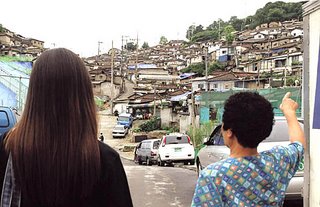(Social strata) Absolute poverty, social policy
| Hankyoreh 21 has an interesting article (registration needed) on the problems of absolute poverty, increasing income gaps and government social policies. The main character of the article is Ryu Chông-sun (Ryoo Chung-soon?), the head of Korea Research and Consulting Institute on Poverty (Pin'gon munje yôn'guso), who points out that the minimum standard of living expenses (or whatever it's called) is the lowest in Korea among OECD countries. (In 2004 it's 1 055 090 won for a 4-member family, 660 €.) Dr Ryu mentions the various "unfortunate neighbor" (puru iut) helping campaigns in media (Chosun Ilbo and Ohmynews among these), and notes that they of course fall short in providing structural solutions to the poverty. She had talked to a 1st-grade handicapped person who had been begging in the subway; the person's 3-member family lived on 730 000 won [480 €] a month, and he (?) was begging to acquire school expenses for the child. She is critical towards the citizens' organizations which went out to the street to protest agains the president's impeachment but have no interest in the poverty problem and fail to criticize the government when it should be done. She is unhappy that the main emphasis of the government social policy is on the "ordinary people's" stratum, the sômin / seomin, especially on their housing. The effect of redistribution through taxes and social welfare on the income gap is 7.9% according to her, while in other OECD countries the effect is normally 40-50% according to Dr Ryu. Let's note that Dr Ryu makes a distinction between the poor stratum (pin'gonch'ûng) and the sômin, which is not always done, especially among the politicians, who conveniently group everything below (in income) middle class with the latter category. Dr Ryu points out a really serious problem, that will haunt the government's legitimacy. But as far as ways of solving it are concerned, I cannot be but reminded of the contradictory results of a social survey done earlier this year: government should pay for social services, but taxes should be lowered.(My earlier post on the matter.)  Adjoining article (registration needed, perhaps) to the one above: citizen organization people on a one-month live-in expedition to live on a minimum subsistence level 609 842 W [400 €] in a poor neighborhood in Haweolgok-dong in Seongbuk-gu. Looking at the pictures (others than the one linked to the right), seems that it was exciting. Adjoining article (registration needed, perhaps) to the one above: citizen organization people on a one-month live-in expedition to live on a minimum subsistence level 609 842 W [400 €] in a poor neighborhood in Haweolgok-dong in Seongbuk-gu. Looking at the pictures (others than the one linked to the right), seems that it was exciting.Now that Nan'gok has been razed to the ground and apartment construction has begun, Haweolgok-dong has perhaps replaced it as the "last hillside settlement". Categories at del.icio.us/hunjang: stratification ∙ Koreansociety ∙ money ∙ |



Comments to note "(Social strata) Absolute poverty, social policy" (Comments to posts older than 14 days are moderated)
Write a Comment